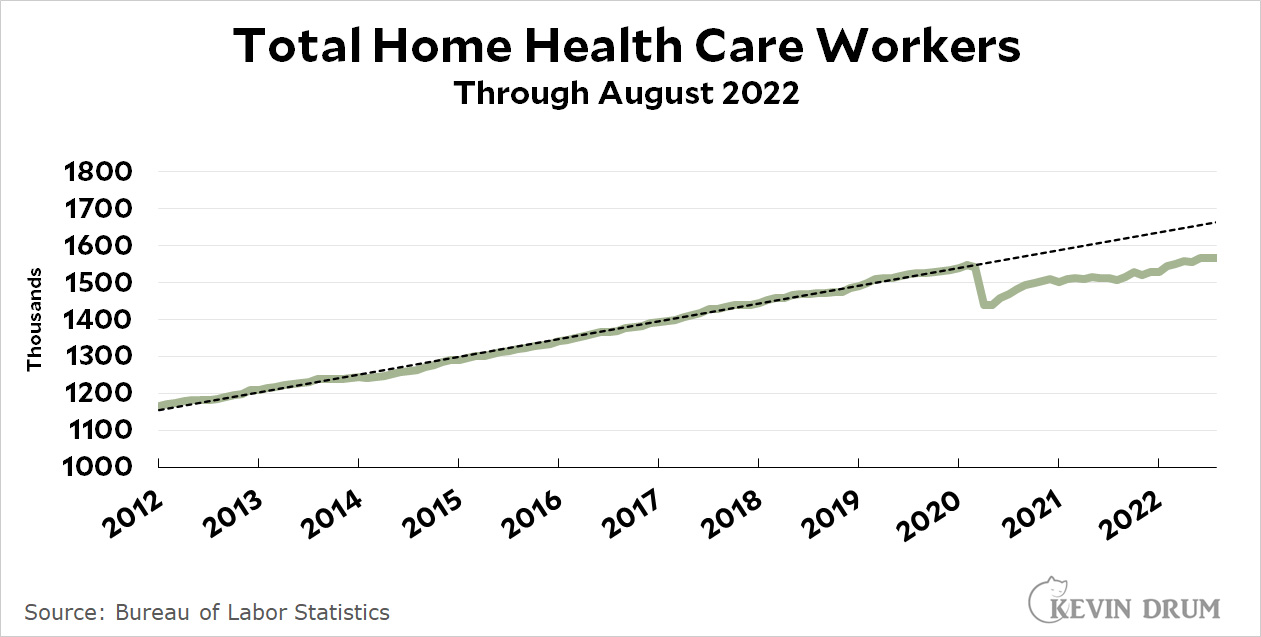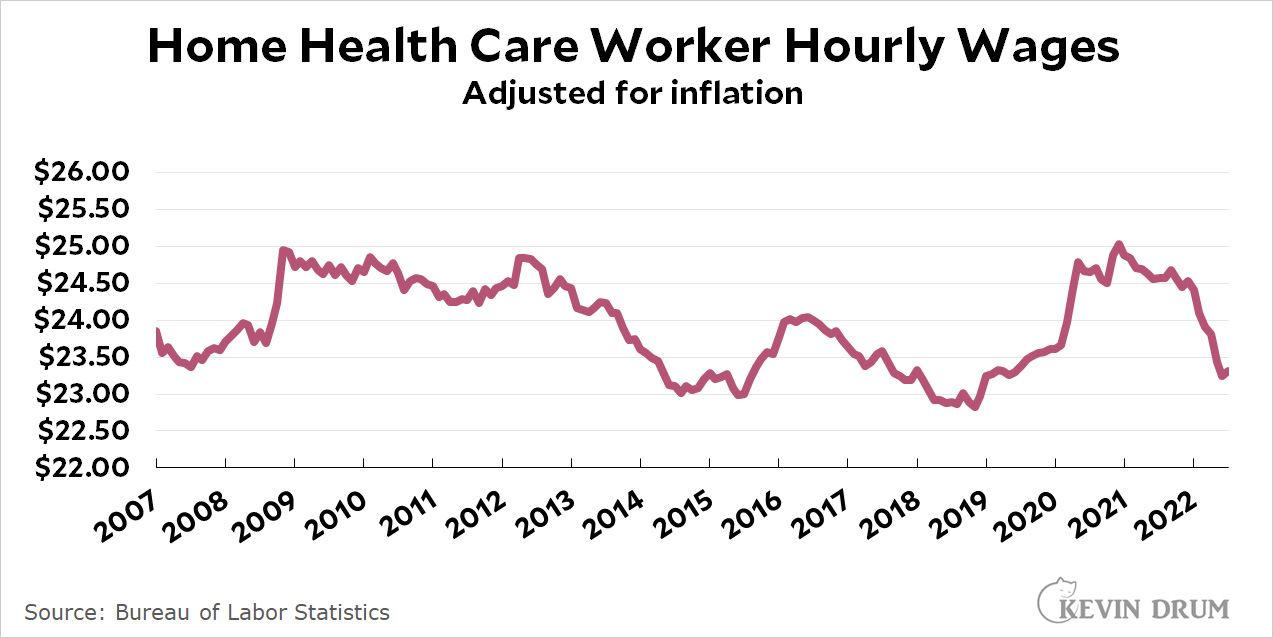The Washington Post tells the story today of Tom and Acey Hofflander:
Amid a national shortage of home-care workers that deepened during the covid-19 pandemic, the couple spent much of this year on a private agency list waiting to be assigned a professional home-care aide. But over four months, from April to August, no aides were available, leaving Acey to carry the load on her own.
....The shortage predates the pandemic but has been exacerbated by it, according to industry and government experts....“Fast food is trying to find workers and retail is trying to find workers and they are all trying to pull from the same labor pool,” said Kezia Scales, senior director of policy research at PHI.
As I'm sure you know, this kind of story is like catnip to me. Is there really a shortage of home health care workers? Did it get worse during the pandemic? Here's what the Bureau of Labor Statistics has to say:
 The Post has it right: The number of workers, which was probably already insufficient, crashed by 100,000 at the start of the pandemic and has never caught up.
The Post has it right: The number of workers, which was probably already insufficient, crashed by 100,000 at the start of the pandemic and has never caught up.
But you know what's coming next, don't you? Here's how much we pay these folks:
 Pay went up at the start of the pandemic, but then slipped back down afterward. It's now less than it was in 2007. And even this overstates things, since it includes all home health care workers, including registered nurses and other specialists. For ordinary unskilled aides, pay is more in the range of $15—which ought to sound familiar.
Pay went up at the start of the pandemic, but then slipped back down afterward. It's now less than it was in 2007. And even this overstates things, since it includes all home health care workers, including registered nurses and other specialists. For ordinary unskilled aides, pay is more in the range of $15—which ought to sound familiar.
Sure enough, the quote from Kezia Scales in the Post story says it all: we're pulling home health care workers from the pool of fast food workers. If that's what we think of the job, is it any wonder that we can't find enough of them?
The only way this gets better is if we pay home health care workers considerably more than we do now. But of course lots of people can't afford that. And that's why this is ultimately a Medicare problem: we desperately need to make long-term nursing care part of Medicare, and we need to pay workers more if we want to attract higher quality folks. This would be expensive, but it's inevitable that it will happen someday. The sooner we accept that the better.

Medicare pays for in-home care. It does not pay for long-term (assisted living) facilities. This of course changes when it comes to hospice care, which Medicare then steps in and covers everything.
The other issue is, if you're homebound (the prerequisite to get in-home care), you are homebound and can't get outside to the store to buy groceries, etc. Or maybe, everyone has switched to Amazon Fresh?
That varies by state too, and over the past 20 years, have become more restrictive. The amount of aid supplied typically amounts to a few hours per day, and families are expected to help with the cost. As the aging process, the biggest problem can be wandering at night. Hiring someone to be there overnight gets expensive--even at $15/hr--it can add up to most if not all of an adult child's take home pay.
One of the rules for coverage requires it to have a therapeutic effect. That's why Alzheimer's nursing home care is typically not covered. I haven't looked in years, but nursing home costs run $10K+ per month. IF you go through that with one parent, assets are depleted when the other needs help. If the adult child(ren) are putting their children through college at the same time--it really is a financial crunch.
Amazon Fresh and Whole Foods deliveries were a godsend for my parents. They were able to last longer in their 1960s house far longer and save from COVID by being able to get groceries delivered. By the end only my dad was driving but carefully not on highways nor at night and only for doctor appointments and haircuts - I think he got covid maybe from the haircut a few days before his fall.
Nah. It does suck but universal healthcare before we dump even more money into care for the olds.
Daily care for olds is a benefit for youngs too, much more so than medical care for olds to extend their life (which if they’re incapacitated in some way actually produces a daily care burden for youngs).
My mom got brain cancer right at the start of the pandemic, and had it not been for pandemic-induced work from home policies, I’d have had nobody just to watch her all day and night. I spent 3 months until she passed away awake at all hours of the day and night dealing with anything she might need. I would’ve given my left arm to have any time leftover for myself, but far too many in our society deem it unnecessary to “dump more money into care for the olds.” So I was left alone to hold down my office job and provide 24/7 home care to someone else. I realize I was super lucky this happened during the pandemic… but society’s youngish people shouldn’t have to hope and pray that their older relatives become invalids during times convenient for their careers. We need long term home care coverage now, to ease the burden on younger people.
Thank you for sharing your story.
OMG I'm living this right now. My parents reached the tipping point in late July after my dad had a fall and acquired COVID in the hospital while recovering. Because I'm working from home, I stashed mom at my house, we're now having to drive her appointments, cook and clean for her and make sure she takes her meds. Now we're moving them to an assisted care facility from the house they've lived in since the 1960s.
Painfully this is occurring at US Gov year end and my job entails a ton of OT and work at this time of the year. My other local sibling is also in a job crunch time with a-hole employers so she is feeling pressure to work no excuses allowed.
We never considered in home care, we know about the shortages and worst of all their house has so many levels it is not wheelchair accessible so dad cannot return to his home.
Sorry for that. My parents and I have talked it over as they are now 70 and if that happens they want to suicide.
My parents were in pretty good health until just a few years ago. My parents golfed into their mid 80s and my dad was still driving until 2 months ago. You really don't know how it is going to go until it actually goes including how you want to handle things.
My parents are hispanic so they'll die sooner rather than later. But you never know. We have hope for 10 good years. My son is 5 and if my parents by age 8 mine were all dead.
Of course my wife is white from a lo g lived family so his other grandparents may have 20 more years even.
Sorry, my grandparents died by age 8. So hopefully they will have more years to build memories.
I never knew 3 of my grandparents, they all died long before I was born - my grandfathers smoked and died in their 50s. But I have great aunts who lived over 100 and many who lived to their 90s.
When the cost is shifted to raise the wages, with what different pool of workers will the competition be?
Speaking of the presumed pool of fast food workers, if they are indeed not in short supply: https://jabberwocking.com/theres-no-labor-shortage-at-fast-food-restaurants/ then is home healthcare indeed really pulling from that pool?
Interesting to observe in fast food the pre pandemic trendline was assumed to be sufficient workers and here it is asserted to be not.
Pingback: That shortage of home healthcare workers | Later On
Do 'fast food workers' really have the skillset to be 'home healthcare workers'? Seriously?
Also, given that the US continues to spend at least twice on medical per capita than the rest of the civilized world, and yet we're cheaping out on their wages, it looks as if a major reform of the whole sickness-care/industrial complex is long overdue.
But won't be possible, with Republicans blocking any and all action.
"Do 'fast food workers' really have the skillset to be 'home healthcare workers'? Seriously?"
That's really the crux of the problem, if the market pays the same wage to for all workers in these categories with no bachelors level degree
1. fast food, retail, basic service sector (line cooks, hotel staff, ect)
2. home health aides/pcas, basic care staff at all group care settings (nursing homes, group care homes, substance use treatment, homeless shelters)
3. care workers for infants through pre-k
Then a) if one of those sectors can increase wages they can draw in better workers from other similar wage sectors and b) if you are financially constrained to being able to pay only low end wages and trying to individually hire a care worker it can be extremely difficult to determine the reliability and quality of a hire. I've seen lots of workers go from care jobs at group homes and homeless shelters to work at a casino that opened because it was $3 an hour better. Now those retail and service sector employers are better able to keep wages and prices up with inflation than any of the publicly funded programs where the workers are lucky to get 3-5% COLA increases even now and all of the reimbursement is negotiated.
Yes. Several people I know who are fast food workers have become home healthcare workers with very limited training. There may be certain things they can't do (in such cases at least formally the relative or a nurse shows up to do it) but most of the job is doable with a minimum of training.
Remember, the home health aide usually takes home $15-20/hr. The home healthcare service that employs her (almost always her), charges $25-30/hr. This work is done almost exclusively by immigrant labor and we've decided to basically shut down the legal immigration pipeline over the past couple of years except for software engineers and stuff like that, and play demeaning political games with the rest. So here we are.
RN here...I make twice that without various differentials working in a hospital, and I'm still hilariously underpaid.
Don't want to pay for grandma to get home health care, grandma ain't getting home health care.
It is 100% the fault of Death Cult Capitalism. There ain't a big profit motive for taking care of grandma.
Pingback: Links 9/27/22 | Mike the Mad Biologist